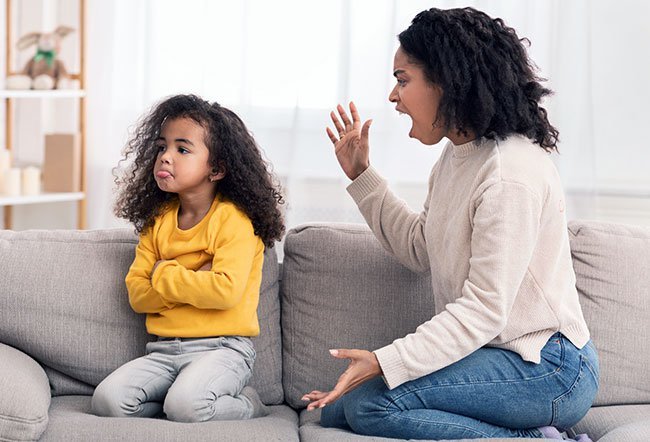Can Yelling at a Child Be Harmful?

All parents want what’s best for their kids. And at times, it can be frustrating to try to discipline your children, especially if they aren’t behaving. But the way you express your frustration can have long-term consequences on your child’s development.
Research shows that yelling and harsh verbal discipline can have similar negative effects as corporal punishment. Children who are constantly yelled at are more likely to have behavioral problems, anxiety, depression, stress, and other emotional issues, similar to children who are hit or spanked frequently.
Yelling at a child can cause more harm when it is accompanied with:
- Hurtful, abusive words
- Blame
- Shame
What are the harmful effects of yelling at a child?
Yelling can have negative and lasting psychological effects on children:
Short-term effects
Short-term psychological effects of yelling at a child include:
- Aggressive behavior
- Symptoms of anxiety
- Behavioral problems (for example, boys are more likely to lose self-control, and girls may react with anger or frustration)
- Withdrawal from the parent
Long-term effects
Long-term psychological effects of yelling at a child include:
- Worsened behavior problems. Some parents use yelling as a quick fix solution to correct bad behavior or to prevent the child from behaving badly in the future. However, studies show that yelling can actually create more issues and worsen a child’s behavior. In many cases, children who are yelled at by their parents don’t change their bad behavior but instead react by increasing their misbehavior. The more the parent yells, the worse the child behaves. This, in turn, leads to more yelling, creating a continuous cycle.
- Changes in brain development. Yelling and other harsh parenting techniques can change the way a child’s brain develops, because the human brain processes negative events faster than positive ones. Magnetic resonance imaging (MRI) scans of people with a history of parental verbal abuse show noticeable differences in the parts of the brain that process sounds and language.
- Depression. When a child is yelled at, they may feel hurt, scared, and sad. If this happens frequently, it may affect the mental health of the child, causing deeper psychological issues such as depression or anxiety. Depression can lead to self-destructive actions, such as drug abuse, risky sexual activity, or suicide attempts.
- Effects on physical health. Experiencing stress as a child can have long-term impacts on physical health. Children who are yelled at and verbally abused by their parents may be at increased risk for certain health problems as an adult.
- Chronic pain. Negative childhood experiences, including yelling, are linked to adult chronic pain conditions, such as arthritis, headaches, back and neck problems, and other chronic pain.
- Emotional problems. Yelling at a child can cause one or more of the following emotional problems:
- Anxiety
- Low self-esteem
- Behavioral problems
- Bullying behavior
- Social problems
What are alternatives to yelling?
Children who have a positive relationship and healthy communication with their parents often adopt good behavior and want to make their parents happy.
Yelling at a child is not the best way to correct bad behavior. Here are some other parenting strategies that may help:
- Leave the conflict zone. Stepping or walking away from the room for a few seconds can give you time to calm down, reassess the situation, and think about what can be done instead of yelling.
- Recognize the triggers. Yelling doesn’t happen out of the blue. It is usually a response to a specific behavior or stress. Self-awareness can help you make better choices and avoid yelling.
- Encourage your child to express their emotions. When your child does something wrong, try talking to them about their emotions and encourage them to share how they’re feeling. Doing this can help your child develop a respectful attitude and understand how you feel about their bad behavior.
- Address bad behavior calmly but firmly. When your child misbehaves, avoid saying hurtful things that could demoralize them. Maintaining eye contact with your child when talking to them about acceptable and unacceptable behaviors creates a strong communication bond.
- Implement consequences and leave out the threats. Children feel threatened when their parents yell or punish them. Instead of yelling when your child misbehaves, implement consequences for their actions. The consequences don’t have to be severe. They can be something simple, such as taking away toys, giving them a time-out, or reducing screen time.
